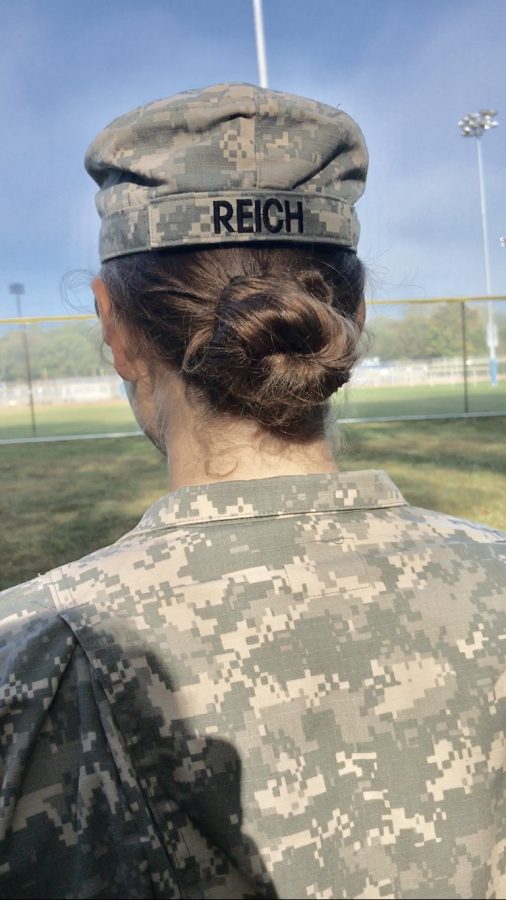Army ROTC cadet aims for balance in school, profession
Kent State’s Army ROTC allows students to serve the country while also earning a degree.
Army ROTC classes are available to take as electives for any full-time student in their freshman or sophomore year.
Cadets who wish to continue past sophomore year must sign a contract in the fall semester of junior year committing themselves to become a soldier in the Army and a commissioned officer upon graduation with a four-year degree.
Kent State had 74 cadets enroll in Army ROTC this year. About 50 percent are expected to continue in the program through senior year, recruiting officer Bill Terry said. All of last year’s cadets successfully graduated from the program.
Cadets in Army ROTC have an advantage over enlisted soldiers who join the Army right out of high school.
“As just an enlisted soldier, you’re deployable and that interferes with your schooling,” said senior cadet and fashion merchandising major Alexandra Reich.
Reich is in Army ROTC and the Ohio Army National Guard. In the National Guard, she was deployable. But since she contracted with Army ROTC her freshman year, she became non-deployable and will graduate with officer status as second lieutenant.
“As an enlisted soldier, you are a follower,” Reich said. “You do the down-and-dirty work. If you want to have more behind the scenes, see how to run, lead, how to actually produce a plan and see it through, that’s more of the officer side.”
Reich said she joined the Ohio Army National Guard to help pay for college.
The Ohio Army National Guard pays the full cost of tuition.
Upon joining Army ROTC, Reich was offered additional money in a monthly stipend, enabling her to pay for school and serve simultaneously.
National scholarships are available through Army RO and require the receiving student to sign a contract to join the Army. These scholarships run from three to four years and pay full tuition and a room and board if granted a scholarship. They require a minimum of 2.5 GPA. Terry said the average GPA of Army ROTC cadets last year was 3.3.
“The military didn’t spark an interest in me at first,” Reich said. “I didn’t believe it would mesh with my life goals as a fashion major. However, it has shaped my path in my fashion career.”
It wasn’t until last year Reich realized she could combine her Army ROTC career and fashion merchandising degree. She said she can use the dedication, commitment and leadership skills she learned in the military to manage in the industry of retail fashion. Reich is looking to become a quartermaster officer or adjutant general officer in the Army.
A cadet’s major, Terry said, does not have to correlate with the cadet’s job in the Army. Certain majors, such as computer science, nursing or information technology do have matching jobs. Of the cadets enrolled in Army ROTC at Kent State, 24 percent are science, technology, engineering and mathematics majors.
Reich stressed time management is key to balancing life as a cadet and a full-time student.
“There are deadlines and they come fast,” Reich said.
Cadets plan not for the week the assignment is due, but up to six weeks ahead of deadline in order to prioritize studying and completing assignments.
“As a senior now, I am a mentor to the younger cadets,” Reich said. “Organization is there. Leadership is there. You have to trust your subordinates and they have to trust you.”
Cadets learn skills applicable both to the Army and college life, such as the leadership skills upperclassmen develop through instructing underclassmen.
“Our professionalism and our maturity level happens a lot quicker,” Reich said. “We have to keep ourselves accountable as soon as we join.”
If not, the cadet could be removed from the program, earn a negative reputation in the military or could be prevented from future employment.
“The instructors here are not like normal college professors,” Terry said. “They spend a lot more time actually getting to know their cadets. It’s closely related to how your parents would treat you than a teacher would.”
Terry said instructors treat each cadet as though they will commit to the full four years.
“Students are coming into a close-knit organization,” Terry said. “You are influenced on a daily basis by all the students around you. This is motivation to improve yourself and to be a part of the team and contribute.”
Terry said the biggest advantage to joining Army ROTC is to continue one’s education.
“This also gives (cadets) the ability to experience a little bit of the army culture and learn about the military,” Terry said. “For every one officer, there are about 25 to 30 enlisted soldiers.”
Many cadets join upon referrals or when friends have been through the program or they have military history in the family.
In Spring of 2018, 24 cadets are expected to graduate and become commissioned as second lieutenants, Terry said.
Kathryn Monsewicz is the military and veterans reporter. Contact her at [email protected].



